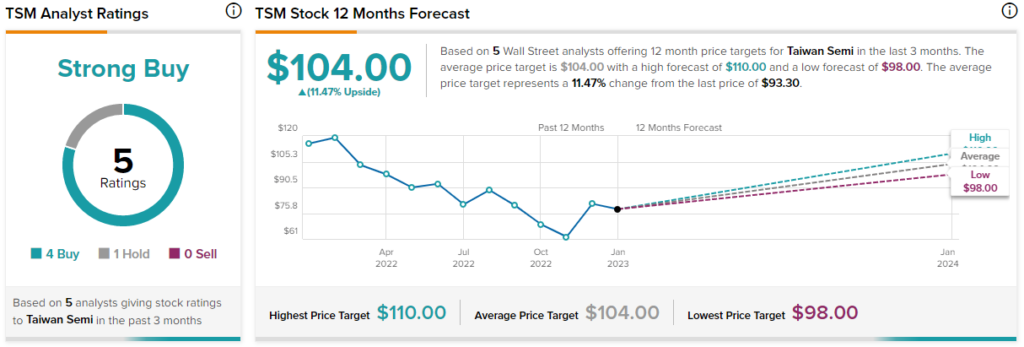The world’s biggest chipmaker, Taiwan Semiconductor (NYSE:TSM), has experienced a 52% rally in the past three months. Meanwhile, the stock is still attractive for multiple reasons, including its strong margins, geographical diversification of its production outside Taiwan, the secular growth of the chip industry, and its attractive valuation. These factors are indeed encouraging, making me bullish on TSM.

Additionally, the world’s most-revered investor Warren Buffett recently showed his confidence in TSM. In mid-November 2022, Buffett’s Berkshire Hathaway disclosed that it added a big stake worth over $4 billion in the company. In fact, TSM stock has a very positive signal from hedge fund managers, who added 53.5 million shares during the last quarter.

Now, before getting into TSM’s catalysts, let’s discuss the company’s solid Q4 financial results, which displayed impressive profitability.
Q4 EPS Beat & Impressive Margins
During the recently reported fourth quarter, the company beat earnings expectations but missed revenue forecasts. Nonetheless, Q4 revenues grew 26.7% year-over-year to $19.9 billion, which is still commendable, given the weak macro scenario. Notably, EPS of $1.87 jumped 62% year-over-year.
The highlight of the quarter, however, was TSM’s impressive margins. For the quarter, its gross margin improved significantly by 950 basis points (bps) to 62.2% compared to 52.7% reported a year ago. Its operating margin of 52% was also 1030 bps higher compared to 41.7% in the prior-year period. This reflects TSM’s pricing power and benefits from economies of scale as well as efficient cost management.
However, looking ahead, the company gave a cautious outlook based on “end-market demand softness, and customers’ further inventory adjustment.” TSM expects slightly lower Q1 revenues of $16.7 billion – $17.5 billion, versus $17.57 billion in the year-ago quarter, Likewise, its gross profit margin is expected to range between 53.5% – 55.5%.
TSM is Increasing and Diversifying Its Production Globally
To alleviate the concerns of supply-chain issues in the future, as well as the geopolitical risk from China’s invasion of Taiwan, TSM is diversifying and increasing its production globally.
For instance, TSM is more than tripling the size of its investment at its new plant in Arizona to $40 billion. When operational, the new chip fabrication facility (also known as fab) is expected to generate revenues of $10 billion. The first fab at the plant is expected to be operational by 2024, while the second one with the production of its most advanced chips — 3nm (3 nanometer or N3) — will start by 2026.
In fact, there was news last year hinting that TSM is looking to expand its production capabilities in Europe, Germany, and Japan. While details of its expansion in these nations have not been laid out yet, the plans could materialize in the coming years.
Further, TSM plans to significantly expand its 3nm production capacity at a new site in Southern Taiwan. During its Q4 earnings call, TSM’s CEO C. C. Wei commented. “We expect a smooth ramp in 2023 driven by both HPC and smartphone applications. As our customers’ demand for N3 exceeds our ability to supply, we expect the N3 to be fully utilized in 2023.”
While the international facilities may cost more to TSM, investors more than welcomed the diversification, focusing on the long-term benefits.
Underlying Chip Demand Remains Resilient
The semiconductor industry and the underlying demand for chips have grown at a remarkable rate in the past few years. The demand is further boosted by the requirements of the cloud industry, which is still in its early growth stage and is expected to be a growing contributor to chip demand.
Another industry that ensures more demand for chips is the EV industry. EVs require many more chips than a regular vehicle. With higher demand and penetration of EVs globally, chip sales will continue to increase.
Additionally, the artificial intelligence space is also growing at a fast pace and will be a direct contributor to the higher demand for chips.
TSM, with its scale advantage and market leadership, should be one of the biggest beneficiaries of the growing demand for chips in the coming years.
Taiwan Semiconductor’s Valuation is Attractive
In terms of its valuation, TSM is trading at an attractive P/E ratio of 15.9x compared to much higher multiples of its peer group. America’s leading semiconductor company, Advanced Micro Devices (NASDAQ:AMD) is trading at 45.2x, while Nvidia (NASDAQ:NVDA) is trading at 86.6x.
In addition, its current valuation reflects a huge discount from its five-year average of more than 20x. This is an attractive discount and likely presents a great buying opportunity, given the strong growth potential for the industry leader.
On top of that, Taiwan Semiconductor’s dividend is well covered by strong free cash flows (FCF) of $17.2 billion and a 54% FCF payout ratio.
Is TSM Stock a Buy, According to Analysts?
The Wall Street community is optimistic about TSM stock. Overall, the stock commands a Strong Buy consensus rating based on four Buys and one Hold. Taiwan Semiconductor’s average price target of $104 implies 11.5% upside potential from current levels.

Conclusion: TSM Remains Attractive for the Long Term
While TSM looks well-poised for the long term, a short-term concern is weaker demand due to recessionary fears. For example, TSM’s FY2023 capital expenditures outlook was lowered marginally to $32 billion – $36 billion compared to $36.3 billion in 2022. Still, this speaks of management’s confidence that demand may be slightly weak in 2023 but will remain strong for the long term.
Investors can wait and watch how the demand scenario unfolds in FY2023 because a weaker economy and lower demand could pull down the stock temporarily. However, if a recession comes in weaker than expected, the stock price may not go lower than current levels.
Longer term, TSM should be able to report consistent growth based on its industry-leading position, strong competitive advantage, resilient margins, strong financials, and stable dividends backed by healthy cash flows. Therefore, I am bullish on the stock and will buy at current levels.









